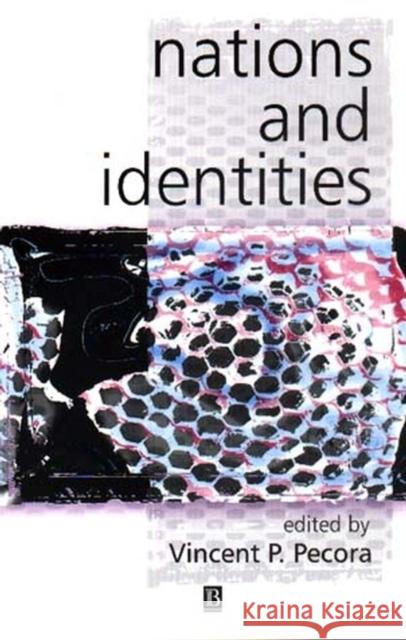Nations Identities Reading » książka



Nations Identities Reading
ISBN-13: 9780631222095 / Angielski / Miękka / 2001 / 392 str.
Nations Identities Reading
ISBN-13: 9780631222095 / Angielski / Miękka / 2001 / 392 str.
(netto: 234,48 VAT: 5%)
Najniższa cena z 30 dni: 244,19
ok. 30 dni roboczych.
Darmowa dostawa!
This anthology brings together selections from some of the most significant writings on the idea of national identity over the last 400 years and includes important contributions to contemporary debates in the social sciences and postcolonial studies.
"Pecora is an extremely thoughtful, intelligent, and substantial scholar. This book will be enormously helpful to students and teachers in colonial and postcolonial studies. The selections are wide–ranging and acutely chosen, and will allow students to connect history to the present, or better still, to see the present as part of a continuing, questionable history." Michael Wood, Princeton University
"This is a timely, reader–friendly anthology that should be widely used both for academic and for more general purposes. It offers ′classic readings,′ as well as a range of ′contemporary perspectives.′ The introduction provides a clear overview from the 1600s down to our postcolonial and transnational moment." Patrick Brantlinger, Indiana University
"Providing an excellent selection of key documents from Hobbes′s Leviathan (1651)to Edward Said′s Culture and Imperialism (1993), Nations and Identities offers the reader genuine insight into the way problems of nation–building and unbuilding, identity–formation and deformation have been addressed across time. Pecora introduces the anthology with an incisive essay that outlines major issues shaping the contemporary discussion of nations and national identity. This book will be of great value for its readers both in courses and across the disciplines." Dominick LaCapra, Cornell University
Acknowledgments.
Introduction: Vincent P. Pecora.
Part I: Inventing the Modern State:.
1. Leviathan (1651): Thomas Hobbes.
2. Two Treatises of Government (1690): John Locke.
Part II: From Divine to Human History:.
3. The New Science (1725; 1744): Giambattista Vico.
4. The Spirit of the Laws (1748): Charles Louis de Secondat (Baron de Montesquieu).
5. The Social Contract, Origin of Inequality, and Government of Poland (1754–72): Jean–Jacques Rousseau.
6. Dissertations on Ossian (1763): James Macpherson.
7. Ideas for a Philosophy of History of Mankind (1784–91): Johann Gottfried von Herder.
8. Discourse on the Hindus (1786): Sir William Jones.
9. Reflections on the Revolution in France (1790): Edmund Burke.
Part III: The Spirit of a People:.
10. Study on Sovereignty (Composed 1793–8; First Published 1884): Joseph de Maistre.
11. Addresses to the German Nation (1808): Johann Gottlieb Fichte.
12. The Philosophy of History (1830–1): G. W. F. Hegel.
13. The Inequality of Human Races (1854): Arthur de Gobineau.
14. Considerations on Representative Government (1861): John Stuart Mill.
15. Nationality (1862): John Emerich Edward Dalberg–Acton.
16. To the Italians (1871): Giuseppe Mazzini.
17 What is a Nation? (1882): Ernest Renan.
18. Our America (1891): José Martí.
19. The Jewish State (1896): Theodor Herzl.
20. The Conservation of Races (1897): W. E. B. Du Bois.
21. Foundations of the Nineteenth Century (1899): Houston Stewart Chamberlain.
Part IV: Nations at the End of Empires:.
22. Home Rule, Enlightened Anarchy, and National Language (1909–39): Mohandas Karamchand Gandhi.
23. The Right of Nations to Self–Determination (1914): V. I. Lenin.
24. Addresses: The Fourteen Points and League of Nations (1918–19): Woodrow Wilson.
25. Aims and Objects of Movement for Solution of Negro Problem (1924): Marcus Garvey.
26. The Myth of the Twentieth Century (1930): Alfred Rosenberg.
27 Three Guineas (1938): Virginia Woolf.
28. Discourse on Colonialism (1955): Aimé Césaire.
29 On National Culture (1959): Frantz Fanon.
Part V: Contemporary Perspectives:.
30. The Integrative Revolution: Primordial Sentiments and Civil Politics in the New States (1963): Clifford Geertz.
31. Nations and Nationalism (1983): Ernest Gellner.
32. Imagined Communities (1983): Benedict Anderson.
33. The Riddle of Midnight: India, August 1987: Salman Rushdie.
34. The Nationalist Resolution of the Women′s Question (1987): Partha Chatterjee.
35. The Origins of Nations (1989): Anthony D. Smith.
36. A Kind of Scar: The Woman Poet in a National Tradition (1989): Eavan Boland.
37. Narrating the Nation (1990): Homi K. Bhabha.
38. Culture and Imperialism (1993): Edward W. Said.
Index.
Vincent P. Pecora is Professor of English and Director of the Center for Modern and Contemporary Studies at UCLA. His book publications include Self and Form in Modern Narrative (1989) and Households of the Soul (1997).
Nations and Identities: Classic Readings brings together selections from some of the most significant writings on the idea of national identity over the last 400 years. Beginning with Hobbes′s and Locke′s early formulations of the modern state, the excerpts chosen illustrate the rich history of the national idea, from Montesquieu, Rousseau, and Fichte to Césaire and Fanon. The nation that emerges is a polymorphous mixture of geography, language, custom, law, religion, economy, race, and collective will.
The collection includes important contributions to contemporary debates about the national idea, from Anthony Smith and Ernest Gellner to Benedict Anderson and Partha Chatterjee. It bridges the gap between a strong, well–established tradition of research in the social sciences and relatively new, culturally based currents of thought in literary and postcolonial studies. A general introduction explores both the history of the idea and current scholarship, and substantive headnotes provide background on each author and selection.
1997-2026 DolnySlask.com Agencja Internetowa
KrainaKsiazek.PL - Księgarnia Internetowa









